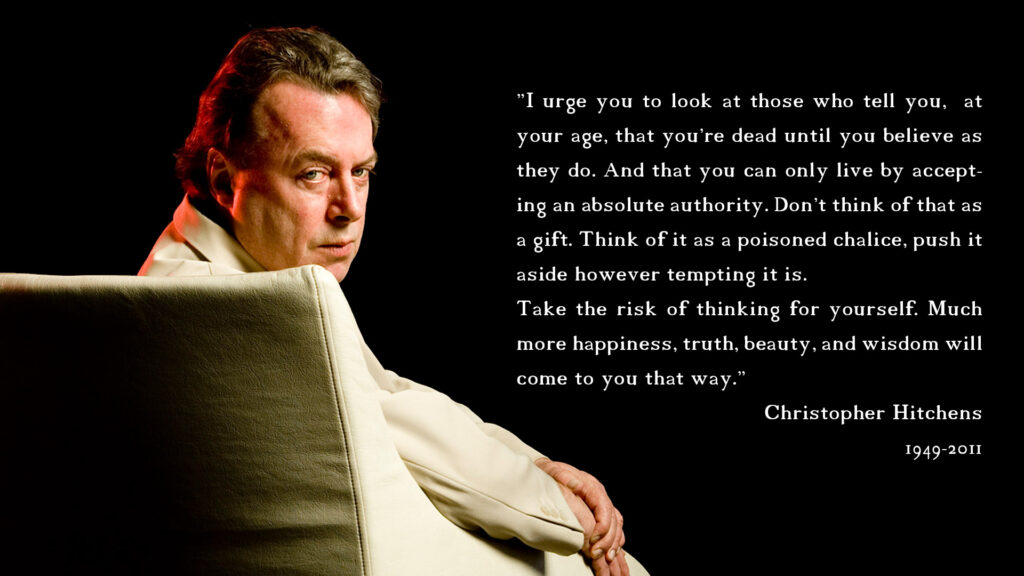Ten years ago, two influential people in my life passed away. My grandmother, Lorraine, died on June 11, 2011. I continue to write stories about her and the impact she had on my life. I don’t often speak about prominent atheists and how they have also helped to shape my character, but Christopher Hitchens was one of them. He passed away on December 15, 2011 after a battle with esophageal cancer. Both had a lasting impact on my life, including teaching me to always seek knowledge, to always question everything and to always try to be a better person than you are today.
When I was a Christian, I found Hitchens a bit abrasive. My first steps into deconverting was in the form of books, including the lectures of The Great Agnostic, Robert G. Ingersoll. I eventually found speeches from others with softer voices, including Sam Harris and Richard Dawkins.
Hitchens’ voice was coarse to me and I was not receptive to what he had to say. Over time, I read what he wrote, didn’t always agree with his point of view, but kept my mind open to the truth and to the message he was trying to convey.
His words always made me think and question why I think the way I do. One particular speech always makes me tear up because of the eloquence and beauty in the words he spoke.
Hitchens did not have this speech prepared, but spoke for two and a half minutes at the end of the debate, “Does a Good God Exist?” with William Dembski. The debate was held November 18, 2010.
I’ll close on the implied question that Bill asked me earlier: Why don’t you accept this wonderful offer? Why wouldn’t you like to meet Shakespeare, for example?
I don’t know if you really think that when you die you can be corporeally reassembled, and have conversations with authors from previous epochs. It’s not necessary that you believe that in Christian theology, and I have to say that it sounds like a complete fairy tale to me. The only reason I’d want to meet Shakespeare, or might even want to, is because I can meet him, any time, because he is immortal in the works he’s left behind. If you’ve read those, meeting the author would almost certainly be a disappointment.
But when Socrates was sentenced to death for his philosophical investigations, and for blasphemy for challenging the gods of the city — and he accepted his death — he did say, well, if we are lucky, perhaps I’ll be able to hold conversation with other great thinkers and philosophers and doubters too. In other words the discussion about what is good, what is beautiful, what is noble, what is pure, and what is true could always go on.
Why is that important, why would I like to do that? Because that’s the only conversation worth having. And whether it goes on or not after I die, I don’t know. But I do know that that’s the conversation I want to have while I’m still alive. Which means that to me, the offer of certainty, the offer of complete security, the offer of an impermeable faith that can’t give way, is an offer of something not worth having. I want to live my life taking the risk all the time that I don’t know anything like enough yet; that I haven’t understood enough; that I can’t know enough; that I’m always hungrily operating on the margins of a potentially great harvest of future knowledge and wisdom. I wouldn’t have it any other way.
And I’d urge you to look at… those people who tell you, at your age, that you’re dead till you believe as they do — what a terrible thing to be telling to children! And that you can only live by accepting an absolute authority — don’t think of that as a gift. Think of it as a poisoned chalice. Push it aside however tempting it is. Take the risk of thinking for yourself. Much more happiness, truth, beauty, and wisdom will come to you that way.
I accept the fact I will never see my grandmother again. There will be no chance meeting of me and Christopher Hitchens in the afterlife because it does not exist. I take the risk of thinking for myself, knowing sometimes I might be wrong, but that I will have learned something in the process and I may have made someone else’s life better in the process.
Until we throw off the weight of religion, we will never grow as a species. Take that risk to think for yourself. Question if what you believe is true or made up centuries ago to keep the people in line and you only believe it because it’s what you were taught. When you think for yourself, you will be happier and see the beauty this world has to offer. And we will all be better off for it.
Picture quote courtesy of JMetalBlast.


Annie
That last paragraph summarizes everything I’ve done since walking away from religion. Thank you for those wise and strong words.